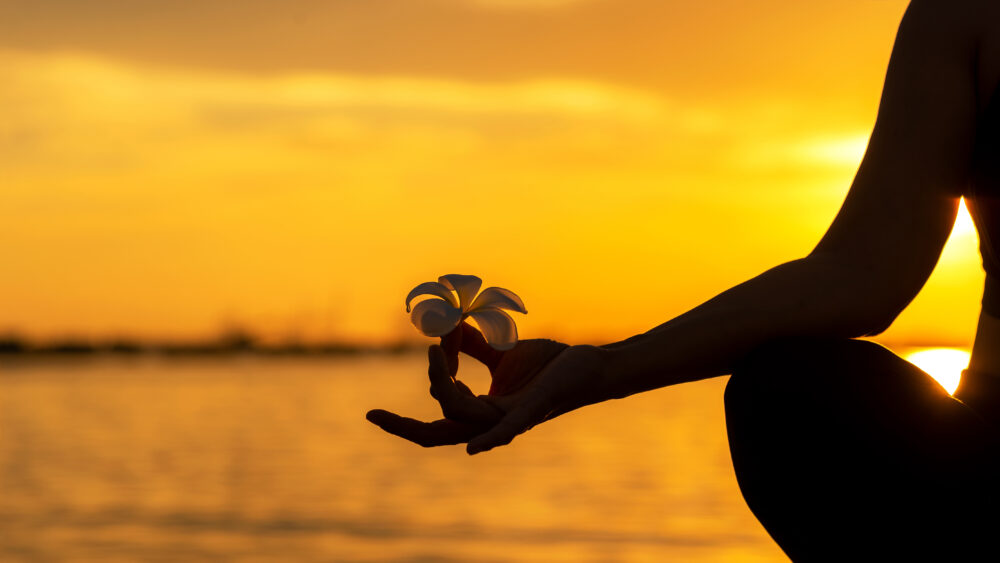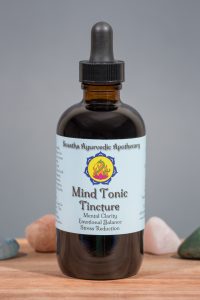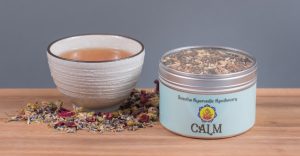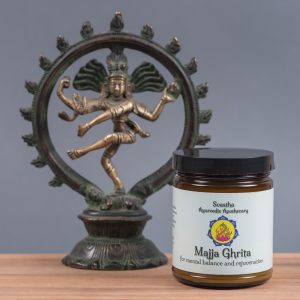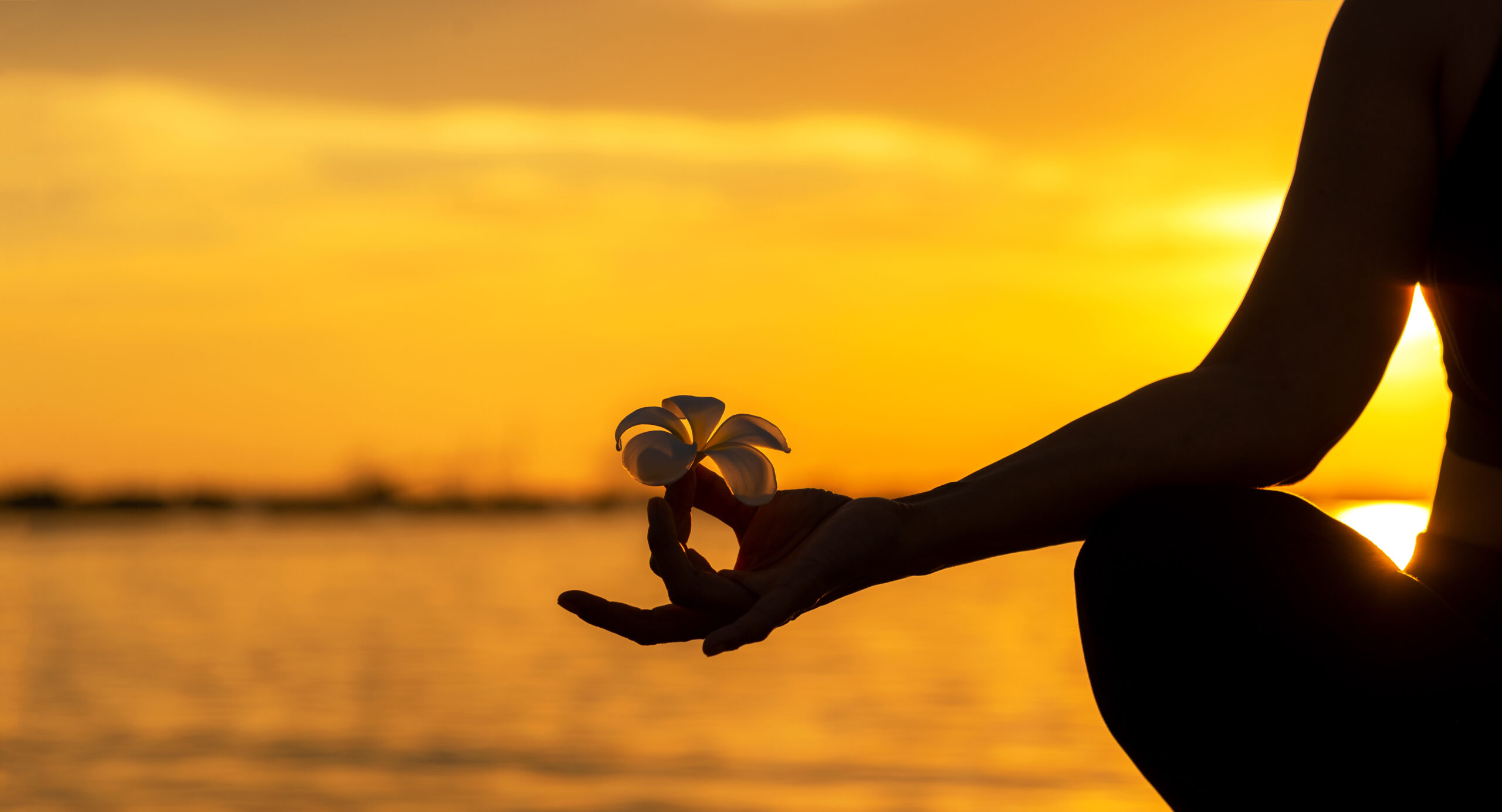
With the cool fall weather sneaking in, Vata dosha is not too far behind, and as Vata increases, anxiety can be one of the first symptoms to manifest. Anxiety can be a very uncomfortable, disruptive emotion and can easily spiral out of control without taking the proper precautions, ideally as soon as your symptoms start to arise. But no matter if the anxiety you are experiencing is mild or severe, acute or chronic, Ayurveda has a vast box of treasures to help calm your mind and soothe your nervous system.
According to Ayurveda, anxiety is a Vata-type emotion and stems from an excess of the Air and Space elements. Similar to Vata, anxiety is said to be light, mobile, dry, and cold, and therefore, most remedies for anxiety will need to nourish the heavy, stable, moist (or oily), and warm qualities to find balance.
Despite anxiety being related to Vata dosha, individuals of all body types can often fall prey to this kinetic emotion. This is not too surprising, given our overstressed, over-worked, under-slept, electronic-based societal demands. Therefore, some of the best treatments for removing anxiety long-term will be to reduce stress, reduce your workload, reduce screen time, slow down, and rest more.
Another area to look at with anxiety is digestion. Although Western doctors are just discovering this mind-gut axis, Ayurveda has stated that an imbalanced or weak digestion is a major cause of mental disorders for thousands of years. And although digestive issues can lead to mental disturbances (such as anxiety), anxiety can also create digestive issues, so it can really be a vicious cycle. But whether your digestion issues or anxiety came first, strengthening the digestion can play a major role in healing anxiety (and vice versa).
When it comes to treating anxiety naturally, toning or activating the Vagus Nerve is a major component. This can be a great way to calm anxiety in an instant (for acute flare-ups), and by incorporating vagal toning practices regularly, you can strengthen your Parasympathetic Nervous System (the “rest and digest” center), reduce cortisol (a major stress hormone) levels, and alleviate anxiety long-term. But don’t go buying any fancy devices for this purpose; almost all of the Ayurvedic recommendations mentioned below will activate the Vagus Nerve naturally (another instance of ancient wisdom correlating with modern science—amazing!).
Setting Up For Success. . .
Once again, my overly thorough Pitta has created a long list of suggestions for you to work with, but before you get overwhelmed, here are a few tips to get started:
- Start slow to avoid being overwhelmed by too many changes at once; this will only increase stress and anxiety.
- Choose one to three recommendations to begin, ideally one(s) that resonates with you the most and seems most relevant for your needs.
- Make realistic goals while still challenging yourself.
- Avoid only taking herbal supplements without making some changes to your diet and lifestyle, as these therapies are far more effective when done synergistically.
- If something is causing your anxiety (school, work, family issues, etc), it is always best to work on removing the cause while also finding relief with these recommendations.
How To Calm Anxiety With Ayurveda
Dietary Recommendations
1. Eat on a regular, healthy meal schedule.
Eating on a healthy schedule balances Vata, blood sugar, mood, and digestion (Agni), all of which are important for stabilizing emotions and preventing anxiety spikes. An ideal schedule will include an early breakfast (7 to 8 am), a mid-day lunch (12 to 1 pm), and an early light dinner (5 to 6 pm).
2. Do not skip meals.
Once you have your healthy eating schedule set, make sure you are not skipping meals or postponing them excessively. Missing meals can lead to anxiety flare-ups, blood sugar crashes, energy slumps, sluggish digestion, mood swings, and overall high Vata. It can also lead to unhealthy snacking on processed foods, which can provoke anxiety further.
3. Eat mostly warm, well-cooked, nourishing meals.
Since anxiety stems from high Vata, eating a Vata-soothing diet can often be helpful. This generally means to eat warm, well-cooked, well-spiced, grounding meals such as kitchari, dals, soups, stews, casseroles, broths, and other healthy “comfort” type foods. Think easy-to-digest meals incorporating healthy oils, lean protein, whole grains, digestive spices, and lots of colorful, well-cooked veggies.
Read more about a Vata-soothing diet here.
4. Avoid raw, cold, frozen, or dry foods.
Since anxiety is considered a light, cold, constrictive, and dry emotion, eating foods with these qualities will only provoke anxiety further. If you are experiencing anxiety, it is best to avoid or limit raw, cold juices; cold smoothies, frozen or chilled foods and drinks, and dry foods such as dry cereal, dry toast, crackers, and rice cakes. Think: cold food and drinks breed coldness and constriction, while warm foods and drinks enhance warmth and relaxation.
If you are a smoothie lover like me, try our Vata-Reducing Sweet Potato Smoothie!
5. Avoid refined and processed foods.
Eating a diet high in refined and processed foods is a major instigator of anxiety. These include white pasta, white bread, chips, crackers, and most prepared, packaged foods, as well as foods made with white sugar, corn syrup, white flour, dyes, preservatives, and most ingredients that you cannot pronounce.
Eating excessive processed foods creates blood sugar fluctuations, which can trigger anxiety, mood swings, and uncontrolled emotions. These foods also cause inflammation, dysbiosis (gut flora imbalance), and lowered serotonin levels, all of which can worsen anxiety symptoms.
6. Eat plenty of protein and fiber with each meal.
I cannot stress the importance of getting an adequate amount of lean protein and healthy fiber with EVERY meal when it comes to treating and preventing anxiety. These macronutrients are well known to stabilize blood sugar, appetite, energy, mood, and Vata. Adequate fiber is also essential for feeding the healthy microbes in your digestive tract, leading to a healthy, happy gut (which leads to a happy, healthy mind).
As a general recommendation, aim for 10 grams of fiber and 15 to 30 grams of digestible protein with each meal, with a daily goal of 25 to 30 grams of total fiber and 50 to 80+ grams of total protein daily (depending on your individual needs).
NOTE: Breakfast and lunch have proven to be the most important meals for getting a high amount of protein to prevent anxiety, while dinner should be a bit lighter to avoid overloading your digestive fire (Agni).
7. Take a digestive aid before meals.
Keeping the gut happy and healthy is essential for calming the mind and reducing anxiety. If you are experiencing gas, bloating, or constipation (all Vata-type issues), taking a digestive stimulant before meals can soothe your digestive symptoms and, in turn, soothe your mind.
Take a digestive aid such as the Agni Elixir or our DIY ginger “appetizer” about 5 to 15 minutes before each meal. You can also drink digestive-enhancing herbal teas such as CCF tea, ginger tea, Detox Tea, Healthy Digestion Tea, or Tulsi Synergy Spice Tea between meals.
8. Avoid caffeinated foods and beverages.
This seems obvious enough, but sometimes gentle reminders can be helpful. Caffeine is a major stimulant and has a direct effect on the nervous system (and therefore Vata), causing elevated anxiety almost instantly. If you are an avid coffee or tea (black, green, or white) drinker and are experiencing high levels of anxiety, giving up all caffeine can be a very powerful way to create mental balance and stability. While weaning off the caffeine, you can try a tasty herbal tea replacement such as our rooibos-based Ayurvedic Spiced Chai.
Lifestyle Recommendations
1. Observe your anxiety without identification.
One of the things I have found most helpful when anxiety starts to arise is to simply observe it, detached, as if watching a movie. It is helpful to recognize that “I am not this anxiety”; it will come and go just as a gray cloud passes through the blue sky (while the sky remains unaffected and unchanged). By not resisting the anxiety but instead observing it, you can find peace, even as the anxiety is pervading.
2. Create a consistent daily routine.
A stable daily routine (dinacharya) creates a stable, calm, and organized mind. A healthy routine includes a consistent eating and sleeping schedule, as well as regular work, exercise, and self-care practices.
Read more about a healthy daily routine here.
3. Practice deep breathing throughout the day.
Many individuals know to take deep breaths when anxiety arises, but in actuality, you should be practicing deep breathing throughout the entire day (let’s all take a deep breath now!). Take the time to deepen and slow the breath while working, driving, eating, waiting in line, or lying in bed until this deep rhythmic breathing becomes a natural habit (and anxiety becomes a thing of the past).
For even more peaceful benefits, I recommend taking at least 5 minutes two to three times daily to sit quietly and focus on deep belly breathing. The best times for this would be upon awakening, before lunch, and before bed (or anytime you can fit it in!!).
NOTE: It is generally recommended to breathe the inhale and exhale through the nose, unless you are practicing a specific breathing technique that requires otherwise.
4. Practice gentle Yoga, meditation, Tai Chi, or Qigong regularly.
Similar to deep breathing, these “energy arts” work on the subtle body to heal, strengthen, and calm the nervous system. They can be a great way to soothe anxiety during a flare-up, but when practiced regularly, they are an amazing and effective way to heal anxiety long-term.
5. Listen to peaceful music.
One of the easiest ways to invoke peaceful energy is to listen to peaceful music. This can be chanting, musical instruments, or soothing “spa-type” music (e.g. ocean waves, rain falling, etc). This can be a beautiful way to reduce anxiety while working, driving, cooking, cleaning, or relaxing at home. If your environment allows, you can even chant or hum along, which stimulates the Vagus Nerve to soothe anxiety from the inside out!
Click here for my favorite handpan artist.
Click here for my favorite soothing vocal artist accompanied by grounding instrumentals.
6. Take a warm ginger bath or sauna soak.
Taking a warm ginger bath* or soaking in the sauna stimulates circulation and relaxation and reduces inflammation. These practices activate the Parasympathetic Nervous System (the “rest and digest” center) and the Vagus Nerve to calm anxiety almost instantaneously. When done routinely, they can heal chronic anxiety and prevent future flare-ups.
*If the ginger soak is not available, replace it with some calming essential oils or Epsom Salt.
Purchase our Ginger Bath Blend here!
7. Perform an oil massage.
Massaging warm oil (ideally medicated) onto the skin is one of the best ways to calm the nerves and heal and strengthen the nervous system. Performing a warm oil massage before bed, moving from head to feet, is a soothing, nourishing way to calm anxiety, ground energy, relax the body, and support deep sleep. If a full body massage is too time-consuming, simply massage around the forehead, ears, and neck to stimulate the Vagus Nerve and end at the feet to relax the entire body through reflexology points.
Read more on Abhyanga (oil massage) here.
8. Exercise daily.
Daily exercise releases stress and tension, calms the nerves, and stimulates endorphins (the feel-good neurotransmitters). To keep Vata from increasing, keep it at a mild to moderate level, avoid overdoing it, and avoid excessive jumping or running. Instead, favor brisk fresh air walks, moderately paced bike rides, swimming, body weight exercises, light weight training, and mild, low-impact cardio (such as elliptical). Although you may need to start slow, make a long-term goal of 30 minutes of movement each day, 5 to 6 days a week.
9. Get out to Nature.
Nature is one of the most grounding medicines for anxiety. Mother Earth is filled with negative ions that calm the nervous system and boost the mood. And although a beautiful, peaceful hike in the forest is lovely, if this is not accessible for you, there are plenty of other options that can be very effective—a fresh air walk, sitting by the water, or even lying in the grass. Just make sure to leave your cell phones and earplugs at home and use this time to breathe in the peaceful, calming energy of the Earth around you.
10. Find your support system.
Anxiety can feel very isolating if you do not have a proper support system to help you through. This can be a therapist, a close friend, a family member, a group, a spiritual guide, a teacher or mentor, or even a pet. One of my most profound supporters is actually my massage therapist (who is amazing in so many ways!), who takes about 30 minutes to check in with me before getting me on the table. Talking about what is going on internally can be one of the most powerful ways to process and release your anxiety.
11. Slow down, simplify, and rest more.
Anxiety is a restless and kinetic emotion, and therefore, bringing slowness and simplicity to your daily life can bring a sense of stability and calmness. Reduce your workload and unnecessary commitments as much as possible and make time for calming self-care practices, resting, nature, friends, and focusing on your health!
12. Make time for things you enJOY.
Anxiety can be easily overcome through feelings of joy and fulfillment. If you are lacking in hobbies and activities that bring you joy, then it is time to make some changes! This could be as simple as coloring, gardening, baking, joining a class (dance, sports, art, etc), making tea dates with friends, going for a hike, or jumping back on your bike. Life should not be a chore, so take a moment to find out what makes you feel joyFULL.
13. Reduce your screen time.
Electronics have a direct stimulating effect on the nervous system, and overuse can provoke symptoms of anxiety. Further, many individuals fall prey to scrolling through news reports that are purposely there to induce fear (as this brings more readers and more money). So be mindful of your electronic use. Limit your non-work screen time to 30 minutes a day or less, turn off those unnecessary notifications (do you really need to know the instant an email comes in?), keep your electronics at home when you go for a walk, avoid electronics after 7 pm, and avoid mindless scrolling, newsfeeds, and social media garbage.
*If you have a computer-based job, counterbalance this with time in nature (even if only sitting outside) for your lunches, after work, and on the weekends.
Herbal Recommendations
1. Adaptogens
Adaptogenic herbs are excellent for calming anxiety, reducing stress, and strengthening the nervous system (so you can take on stress more gracefully). My favorite Ayurvedic adaptogens are Ashwagandha, Tulsi (holy basil), and Yestimadhu (licorice).
2. Medhya Herbs
Medhya herbs are a group of herbs that calm, heal, and strengthen the nervous system, making them an essential part of treating anxiety. Some of the most potent medhya herbs include Ashwagandha, Brahmi, Shankapushpi, Jatamansi, Yestimadhu (licorice), Guduchi, Shatavari, Pippali, and Ginger.
Try our medhya-based Saraswati Churna!
3. Herbal Teas
Herbal teas containing these medhya and adaptogenic herbs can be an easy and enjoyable way to heal anxiety. Herbal teas are slightly less potent than other substances (such as tinctures and medicated ghee), but they are safe, accessible, effective, and delicious. A few calming options that I really enjoy include CALM Tea*, OM Shanti Tea, Sleepy Tea*, Brahmi-Tulsi Tea, and Tulsi-Ashwagandha-Ginger Tea.
*I especially love these blends with a splash of milk and honey!
Find peace with our OM Shanti Tea!
4. Medicated Ghee
Medicated ghee is one of the best methods for treating anxiety, as its lipid base is said to break through the blood-brain barrier. To target anxiety, you will want to use a medicated ghee containing some of the herbs mentioned above. A few common formulas include Majja Ghrita, Ashwagandha Ghrita, Rasayana Ghrita, and Brahmi Ghee. These can be taken melted in warm water (for the daytime), and either warm milk or water before bed. For times of severe anxiety, you can take a medicated ghee with powdered herbs, such as taking 1 teaspoon of Majja Ghrita melted in warm water with ½ teaspoon of Saraswati Churna.
Try our handcrafted Majja Ghrita!
5. Medicated Oils (for massage)
To enhance the anxiety-reducing health benefits of your oil massage, it is highly recommended to use a medicated oil with calming, Vata-soothing herbs and essential oils. Some great options include Vata Massage Oil, Ashwagandha-Bala Tailum, or a DIY refined sesame oil with calming essential oils (e.g. lavender, chamomile, rose, tulsi, rosemary) added.
6. Nasya (nasal) Oil
The nasal passage is the gateway to the mind, making nasya (nasal oil application) an excellent practice for calming anxiety. Of course, it will be best to use a nasya formula that contains calming, adaptogenic, and/or medhya herbs. Some soothing options include Prana Nasya (for daytime), Nidra Nasya (for before bed), Brahmi Ghee Nasya, and Vacha Nasya.
Conclusion
Although anxiety can be uncomfortable and disruptive, making the proper diet and lifestyle changes can be extremely effective in both treatment and prevention. There are numerous therapies and practices you can incorporate to calm the mind and support mental balance, but it is important to avoid doing too much too soon. The best path is to choose one to two suggestions from each category (i.e. diet, lifestyle, herbs) in order to ensure a well-rounded treatment plan. Even making a couple of small changes can bring positive change and noticeable relief. But always remember: consistency is essential, even after your anxiety has subsided, if you want real, long-term benefits.

